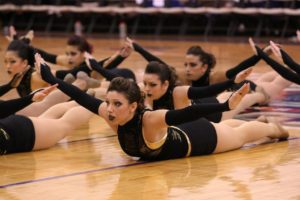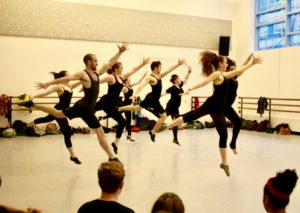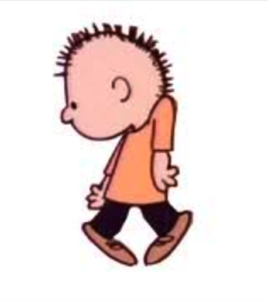
Serious dancers have choices to make to pursue their passion to a professional career. The differences in these three choices primarily reflect the amount of focused study in dance to the inclusion or exclusion of other subject areas.
Pre-professional programs (sometimes called trainee or apprentice program) at a professional ballet company school, for instance, will usually comprise a day beginning with ballet technique classes followed by rehearsals either with a second company or the main company in the corps or ensemble roles. Classes in partnering, variations, modern, jazz, choreography, etc. may also be included. Students are generally in their last few years of high school (and work to finish their high school courses) or just graduated from high school. Training and performance is emphasized and the opportunity to be seen by and perform with professionals leading to the possibility of being hired. It may be advisable to go through the college application process and then defer admittance to pursue this path for a year or two. It is very important to know the focus of the program/company in terms of repertoire and style and how the faculty teach technique class as study will generally be with only 2-3 teachers. There is generally a high level of competition to be accepted into these programs.
Advantages:
- Maximizing training hours in the company studios and onstage at a younger age
- Exposure to and total focus on dancing at a high level with possibility of being hired by that company
- Experiencing and witnessing what it is like to work professionally and having an opportunity to perform with professionals
- Costs much less than college and oftentimes includes a stipend and help with housing
- Possibility of more focused attention from the fewer number of teachers who get to know their students well
- Relatively small faculty and small peer group.
Conservatory programs offer BFA degrees (Bachelor of Fine Arts) and focus strongly on dance and related arts with relatively few required courses in academic, non-arts. These are generally self-contained institutions such at The Juilliard School or North Carolina School of the Arts where all the students art studying one art form very seriously with exposure to and study of the other art forms. There is often the opportunity for students to study composition and choreograph. The faculty is generally comprised of professionals who work/worked extensively in their field. There is generally a high level of competition to be accepted into the premiere programs.
Liberal Arts College programs offer BA and sometimes BFA and MA/MFA degree programs in dance. The focus is on providing a liberal arts education through a required core curriculum of academics with a focus on dance. The first 2-3 semesters (depending on AP credits from high school) include these core academics alongside dance and arts requirements. While there are a few programs with distinct major programs in a Ballet and a Modern Dance Department, most colleges and universities have one Dance Department and offer training in both ballet and modern and other dance forms as well as related arts. Many programs offer related majors, minors or certifications such as in Arts Administration or Pilates; there is generally a wide array of elective courses within the department and performing arts to pursue a secondary interest. There is usually the possibility to study composition and choreograph as well as study pedagogy and student teach. There is the possibility at most programs to double major or minor in either a related art or an academic area although a double major is generally extremely demanding and often discouraged. Most but not all departments require an audition and the competitiveness to be accepted varies widely. The focus, training, faculty background and size, course offerings, performance opportunities, guest artists, and facilities also vary widely. It is very important to research and understand these factors at each department you are considering in relation to your goals.
In summary, there are more choices than ever to pursue dance beyond high school. It may be helpful to seek the advice of a professional college counselor and a professional in the dance field to help guide you. High School counselors, except at Performing Arts High Schools, and parents, unless they are in the arts profession, do not feel qualified with enough information to advise their students/children on their dance education and career. Because it is such a specialized field, it is wise to get specialized advice, assessment and assistance from a expert performing arts counselor or a dance professional.
-Diane Coburn Bruning
Choreographer
Dance and Performing Arts Consultant, College Match
Diane is a nationally-recognized choreographer working with professional dance, opera and theatre companies throughout the U.S. and abroad. She has been a guest artist at over 25 universities, conservatories and professional schools. She is a graduate of Butler University and NYU in Dance with post-graduate study at Yale School of Drama. If you have questions, you may write her at [email protected]

